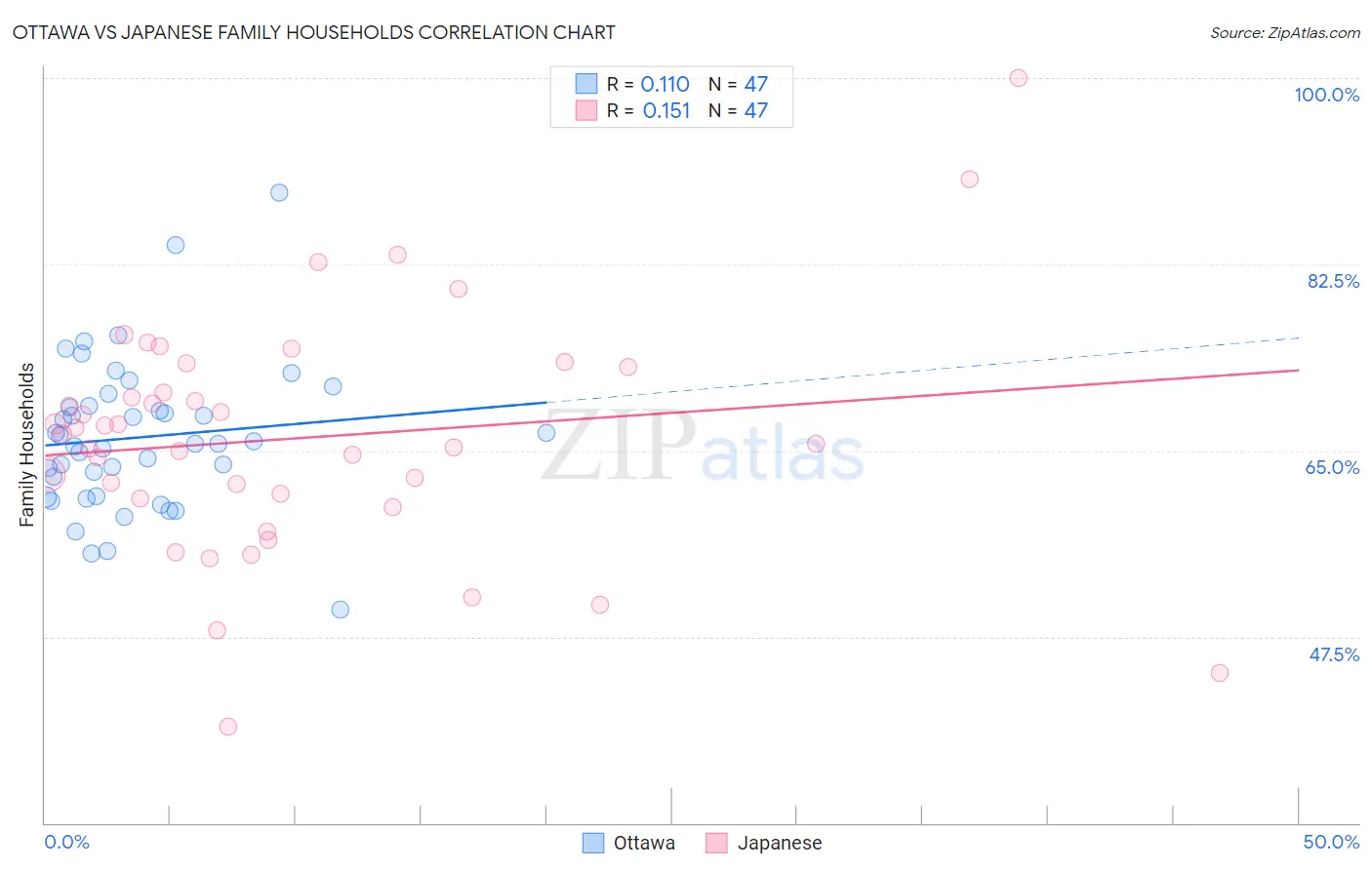Ottawa vs Japanese Family Households
COMPARE
Ottawa
Japanese
Family Households
Family Households Comparison
Ottawa
Japanese
63.0%
FAMILY HOUSEHOLDS
0.3/ 100
METRIC RATING
277th/ 347
METRIC RANK
65.9%
FAMILY HOUSEHOLDS
99.9/ 100
METRIC RATING
68th/ 347
METRIC RANK
Ottawa vs Japanese Family Households Correlation Chart
The statistical analysis conducted on geographies consisting of 49,944,420 people shows a poor positive correlation between the proportion of Ottawa and percentage of family households in the United States with a correlation coefficient (R) of 0.110 and weighted average of 63.0%. Similarly, the statistical analysis conducted on geographies consisting of 249,074,128 people shows a poor positive correlation between the proportion of Japanese and percentage of family households in the United States with a correlation coefficient (R) of 0.151 and weighted average of 65.9%, a difference of 4.6%.

Family Households Correlation Summary
| Measurement | Ottawa | Japanese |
| Minimum | 50.0% | 39.1% |
| Maximum | 89.2% | 100.0% |
| Range | 39.2% | 60.9% |
| Mean | 66.2% | 66.2% |
| Median | 65.7% | 66.6% |
| Interquartile 25% (IQ1) | 60.7% | 60.5% |
| Interquartile 75% (IQ3) | 69.2% | 72.9% |
| Interquartile Range (IQR) | 8.6% | 12.4% |
| Standard Deviation (Sample) | 7.1% | 11.2% |
| Standard Deviation (Population) | 7.0% | 11.1% |
Similar Demographics by Family Households
Demographics Similar to Ottawa by Family Households
In terms of family households, the demographic groups most similar to Ottawa are Immigrants from Belgium (63.0%, a difference of 0.040%), Serbian (63.0%, a difference of 0.050%), Lumbee (63.1%, a difference of 0.070%), West Indian (63.1%, a difference of 0.070%), and Immigrants from Kazakhstan (63.1%, a difference of 0.080%).
| Demographics | Rating | Rank | Family Households |
| Immigrants | Austria | 0.3 /100 | #270 | Tragic 63.1% |
| Immigrants | Croatia | 0.3 /100 | #271 | Tragic 63.1% |
| Immigrants | Turkey | 0.3 /100 | #272 | Tragic 63.1% |
| Immigrants | Kazakhstan | 0.3 /100 | #273 | Tragic 63.1% |
| Lumbee | 0.3 /100 | #274 | Tragic 63.1% |
| West Indians | 0.3 /100 | #275 | Tragic 63.1% |
| Serbians | 0.3 /100 | #276 | Tragic 63.0% |
| Ottawa | 0.3 /100 | #277 | Tragic 63.0% |
| Immigrants | Belgium | 0.2 /100 | #278 | Tragic 63.0% |
| Immigrants | Yemen | 0.2 /100 | #279 | Tragic 63.0% |
| Immigrants | Bulgaria | 0.2 /100 | #280 | Tragic 63.0% |
| Estonians | 0.2 /100 | #281 | Tragic 62.9% |
| New Zealanders | 0.1 /100 | #282 | Tragic 62.9% |
| Immigrants | Denmark | 0.1 /100 | #283 | Tragic 62.9% |
| Australians | 0.1 /100 | #284 | Tragic 62.8% |
Demographics Similar to Japanese by Family Households
In terms of family households, the demographic groups most similar to Japanese are Fijian (65.9%, a difference of 0.020%), Filipino (65.9%, a difference of 0.020%), Malaysian (65.9%, a difference of 0.030%), Immigrants from Afghanistan (65.9%, a difference of 0.040%), and Costa Rican (65.9%, a difference of 0.060%).
| Demographics | Rating | Rank | Family Households |
| Danes | 100.0 /100 | #61 | Exceptional 66.0% |
| Central Americans | 100.0 /100 | #62 | Exceptional 66.0% |
| Immigrants | Indonesia | 100.0 /100 | #63 | Exceptional 66.0% |
| Pima | 99.9 /100 | #64 | Exceptional 65.9% |
| Costa Ricans | 99.9 /100 | #65 | Exceptional 65.9% |
| Fijians | 99.9 /100 | #66 | Exceptional 65.9% |
| Filipinos | 99.9 /100 | #67 | Exceptional 65.9% |
| Japanese | 99.9 /100 | #68 | Exceptional 65.9% |
| Malaysians | 99.9 /100 | #69 | Exceptional 65.9% |
| Immigrants | Afghanistan | 99.9 /100 | #70 | Exceptional 65.9% |
| Bhutanese | 99.9 /100 | #71 | Exceptional 65.9% |
| Portuguese | 99.9 /100 | #72 | Exceptional 65.8% |
| Laotians | 99.9 /100 | #73 | Exceptional 65.8% |
| Burmese | 99.9 /100 | #74 | Exceptional 65.7% |
| Houma | 99.9 /100 | #75 | Exceptional 65.7% |